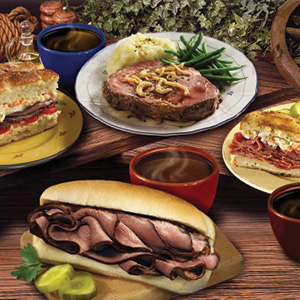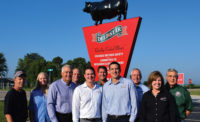While the foodservice industry has been sent reeling by the downturn in the U.S. economy, other sectors of the food industry have had tremendous growth opportunities. With more Americans staying at home to eat or bringing their lunch to work, deli meat manufacturers have had the potential of reaching a broader audience than before.

|
Even in that category, however, the combination of rising meat prices and limited funds has led some consumers to shy away from premium lunch meats, choosing cheaper products or pre-sliced items. One California processor has devised a solution to help increase its own volume while increasing sales at the deli counter.
Headquartered in Vernon, Calif., Charlie’s Pride Meats processes premium deli meats, including roast beef, corned beef and pastrami. It was founded in 1969 by Charles Dickman, and he serves as co-president along with his sons, Robert and Jim. It was Robert Dickman who came up with the idea of boosting sales by giving away au jus packets to the company’s customers. Mixed with boiling water, the contents of the packets turn into an appetizing complement to the company’s roast beef or pastrami products.
“It makes a luncheon meat into a dinner meal,”Dickman says.
The foil packets come in beef, Cajun and Italian au jus mixes, as well as a dipping jus for pastrami and one for corned beef. On the back of each packet, there are several recipes developed by the company’s chef, Eric Stein. The Cajun au jus packet includes a recipe for a warm bayou roast beef sandwich, while the pastrami dipping jus packet includes one for a beer-braised pastrami sandwich.
Charlie’s Pride includes the packets in the boxes of meat that it sells to its retail customers. The retailer, in turn, puts an easel on the deli case announcing that customers get a free packet of au jus when they purchase one pound of Charlie’s Pride meat.
“We know the average sale at a retail deli counter is anywhere from a quarter- to a half-pound,”Dickman says, noting that the promise of a free au jus mix is often enough to encourage customers to increase the size of their purchase.
“The consumer gets something for free, [when] he or she doesn’t get anything for free today. We give it to the retailer for free, and they get a bigger [cash register] ring, which in turn gives us more business,”Dickman says.
Charlie’s Pride can either make the packets with the company’s name and logo on the front, or it can print them with the name of the retailer. The promotion was developed in 2009 and implemented the following year, and wherever the program has run, Dickman says that deli sales have gone up 20 to 30 percent. The company has a similar program in place for its foodservice customers.
Charlie’s Pride does not offer the au jus packets all the time. Rather, they are used to showcase a new product or used with an existing product to show retailers that the company is doing what it can to try and help sales in the deli area. With so many varieties, it also can rotate the featured packet on a regular basis. They have become so popular that he often gets calls from retailers looking to buy the packets, but he has resisted selling them separately.
“If we do, then it becomes not special anymore,”he says. “We want to keep the mystique.”
The small size of the packets allows for easy shipping to retailers, but there is still a cost in manufacturing and packaging the powder. Dickman chalks that cost up to the price of thinking outside of the box.
“We understand that we need to be better than the big guys,”he adds. “As a smaller processor, you have to do things that others won’t do.”
The premium deli market has been a successful niche for Charlie’s Pride. Along with its regular line of roast beef products, it offers specialty items such as Angus and American Kobe beef as well as Korubota ham. The company added a second facility in Vernon in 2009, and now employs more than 150 people. Dickman notes that Charlie’s Pride grew in 2010 despite a difficult economic landscape, and it’s done well to date in 2011.
A well-balanced portfolio is one of the company’s strengths, as its sales are split 65 percent in retail and 35 percent in foodservice. Part of the company’s recent growth has come from focusing strongly on increasing its foodservice sales.
“When restaurants are down in [customers], that’s a good time to look at possible changes,”he points out. “If things aren’t working and they’re not profitable, they’ll be looking at making changes.”
Dickman notes that his family’s business is entrepreneurial-minded and has the capability to move quickly on new ideas. Just as he does with the deli sector, Dickman believes that supporting the foodservice sector now will pay bigger dividends in the future.
“Things will turn around for them, and [we’ll all] start making money again,”he says.










Report Abusive Comment